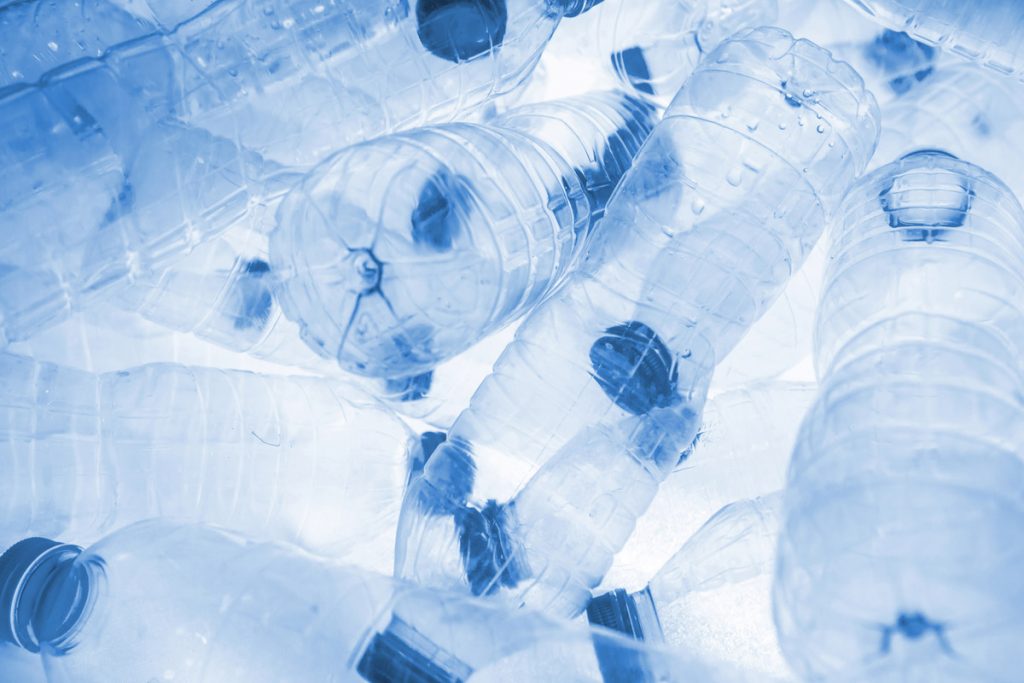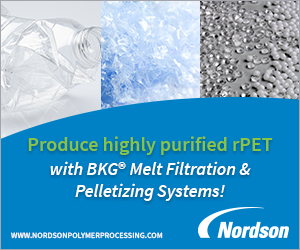
A number of companies recently gained approval to use their technologies to produce recycled resin for sale into food and drink packaging markets. | Nixx Photography/Shutterstock
A chemical recycling startup, a massive resin producer, equipment providers and packaging producers are among the companies that have received the green light to recycle plastic into food and drink packaging.
Over the past six months, the FDA has awarded 11 letters of no objection (LNOs) to 10 companies seeking to use different recycling technologies to produce post-consumer resin (PCR) suitable for food contact. The LNOs cover chemical and mechanical recycling technologies for PET, HDPE and PP.
LNOs allow plastics recycling companies to use their technologies to produce recycled resin for sale into food and drink packaging markets. In issuing the letters, the FDA was convinced the recycling processes would result in contaminant concentrations of 0.5 parts per billion or less in the food, below its “threshold of regulatory concern.”
Plastics Recycling Update publishes a roundup of LNOs twice a year. The last roundup, which was published in March 2021, covered letters issued in late 2020. The database of all FDA LNOs is available here.
Chemical and mechanical recycling of PET
Loop Industries on March 1 received an LNO for the startup’s depolymerization technology. The LNO allows the resulting recycled resin to be used in all temperatures.
Next Generation Recycling (NGR) on March 2 received an LNO for its mechanical recycling technology, which produces PCR that can be used in packaging used at temperatures ranging from freezing up to hot filled/pasteurized over 150 degrees Fahrenheit.
OCTAL SAOC FZC on April 21 received an LNO for its chemical recycling technology. The LNO allows the PCR to be used in packaging exposed to any range of temperatures.
Guolong Recyclable Resources Development on May 25 received an LNO for its mechanical recycling technology. According to the FDA, the process can be used to produce single-layer containers for fruits, vegetables and shelled eggs at temperatures ranging from frozen up to room temperature.
Diamat Maschinenbau on May 28 received an LNO for its mechanical recycling technology, which can make packages subjected to temperatures from frozen up to hot filled/pasteurized over 150 degrees Fahrenheit.
DAK Americas, the largest PET producer in the Western Hemisphere, received an LNO covering a chemical recycling process on June 14 and an LNO for mechanical recycling on June 24. The chemical recycling LNO doesn’t include a temperature restriction. At the low end, the PCR from the mechanical process can be used to make packaging for food that’s stored frozen and reheated in the package. On the high end, the packages can be hot filled/pasteurized over 150 degrees Fahrenheit, according to the FDA.
Zhenjiang Ceville Recycled Fiber on June 24 received an LNO for its mechanical recycling process. The output PCR can be used to produce single-layer containers for fruits, vegetables and shelled eggs at temperatures ranging from frozen up to room temperature.
Polyolefins recycling technologies
Closure Systems International on April 8 received an LNO for its mechanical process used to recycle HDPE. The technology can be used to make caps and closures exposed to all temperatures.
Fresh Pak Corporation on April 9 received an LNO for a mechanical HDPE recycling process that produces PCR that can be exposed to a wide range of temperatures. At the low end, the packages can be used to store food at frozen temperatures and then reheated in the package. At the high end, they can be exposed to heat-sterilized temperatures over 212 degrees Fahrenheit, according to the FDA.
Lotte Chemical on May 18 received an LNO for its mechanical recycling process to recycle PP, which can be used to make packages with up to 70% recycled content. Those packages can be used at temperatures ranging from frozen (no reheating in the container) to hot filled/pasteurized but under 150 degrees Fahrenheit.
More stories about technology
- RIT researchers develop AI-based textile recycling system
- Industry nuance is key in adopting emerging technology
- Google, Dow partner on AI to identify recyclables



